Table of contents
Spring
- When will grass start growing?
- When should I fertilize my lawn?
- When to put pre-emergent down?
- When should I overseed my lawn in the spring?
- When should I drought-proof my grass?
- When should I aerate my lawn?
Summer
- When do I water my lawn?
- When should I plant new grass?
- When to use post-emergent?
- When should I keep off the grass?
Fall
- When should I reseed my lawn?
- When is the best time to spray weed killer?
- When do I dispose of leaves?
- When do I stop watering my lawn?
Winter
- When should I leave my grass alone?
- When should I deal with snow?
- When should I frost seed?
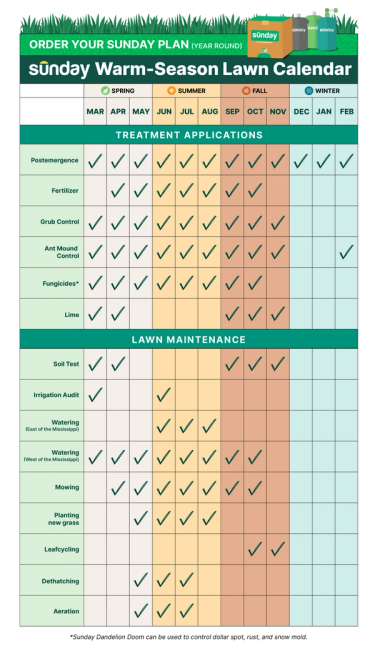
The whens and outs of lawn care
If you’re wondering, “When should I fertilize my lawn?” you’re not alone. Wondering when to start seeding grass? We’ve got you. When to apply weed and feed? Easy, don’t! Let’s dig in.
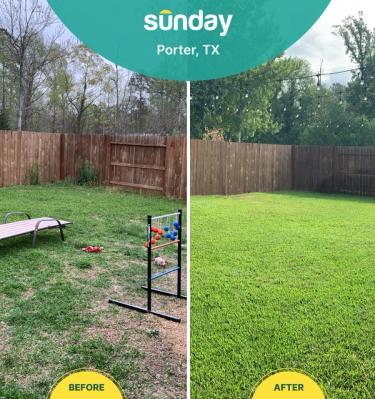
Scroll for a simple when-to-do list
Or let us do the calendar-checking for you! With a custom Sunday plan, your fertilizer, grass seed, and weed control will arrive when it’s time to use them.
Ready for a custom plan?
Our lawn engine uses satellite data to map out your lawn size and determine things like average rainfall, common weeds, and pest activity.
Spring (March–May)

When will grass start growing?
Get excited—your grass is coming out of winter dormancy! Now is the time to sharpen your mower blades, audit your irrigation system, and get a fertilizer plan.
When should I fertilize my lawn?
Apply fertilizer as soon as your grass starts growing. We believe in targeted nutrient dosing, which is better for your lawn and the environment. To learn what you need, get a free soil test.
When to put pre-emergent down?
It’s time to watch for weeds. Skip the brute force approach of pre-emergence, and pull weeds as you see them. Got dandelions? They provide early forage for bees—so consider letting them flower, then removing them before they set seed.
When should I overseed my lawn in the spring?
Sunday recommends patching bare spots and thickening your grass in spring, to send it into summer strong. For cool-season climates, you can overseed in early spring. For warmer climates, it’s great to seed, sod, or plug (depending on grass type) in late spring. You can repeat this later in the year: ideally in the summer for warm-season grass, and in the fall for cool-season grass.
When should I drought-proof my grass?
The time to prep for summer heat is now! By irrigating deeply—and thus growing deeper, moisture-holding roots—you can train your lawn to use less water.
When should I aerate my lawn?
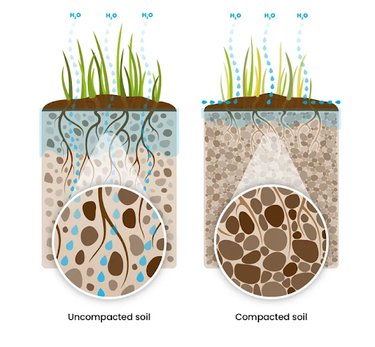
Believe it or not, most people don't need to aerate their lawn! But if you've tested and have a compaction problem, the best time to aerate cool-season lawns is mid to late spring, or in the fall. For warm-season lawns, it's best to wait till late spring or early summer.
Sunday Tip:
Enjoy your little spring sanctuary! You can watch for migrating birds, enjoy coffee in your yard, and feel the grass between your toes, knowing Sunday fertilizers are better for bare feet.
Summer (June–August)

When do I water my lawn?
It’s best to water deeply and infrequently—about 30 minutes, two-three times a week (roughly 0.5 inches per session). Only water in the early morning or evenings, and avoid watering if natural rainfall is enough.
If you’re in the eastern half of the U.S., you may deal with excess precipitation and need to improve drainage or manage flooding with a rain garden. On the other hand, folks in the western U.S. may be facing drought and need to learn how to water with annual water restrictions in place (we’ve got you here!).
When should I plant new grass?
If you have warm-season grass, then mid-summer is a great time for propagation—aka, planting new grass. You can patch up bare spots using sprigs, plugs, or sod, or if you have bermudagrass, you can use seeds as well. Growing cool-season grass? You can patch bare spots anytime, but jump ahead to our fall section for tips on overseeding.
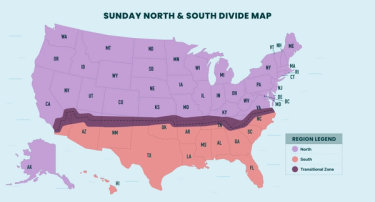
When to use post-emergent?
Continue being proactive by taking weekly walks around your lawn and pulling weeds by hand or applying Sunday spot treatments. This will help you control weeds before they get out of control.
When should I keep off the grass?
Summer turf may be under stress from drought, disease, turf pests, and scorching heat. Reduce foot traffic on the grass, especially if you just applied fertilizer.
Sunday Tip:
Backyard barbecues, slip & slides, and movie nights under the stars—these are practically synonymous with summer! Remember to enjoy your great outdoors.
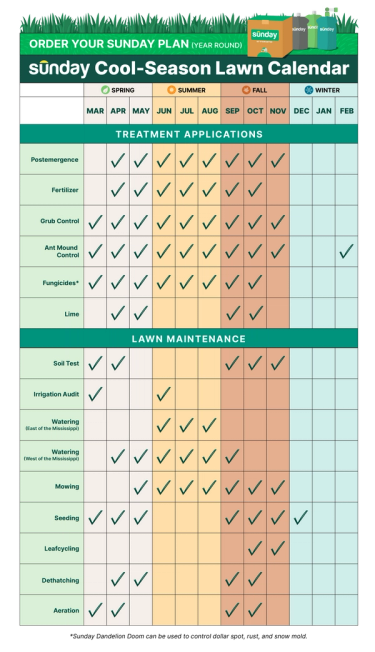
Fall (September–November)
When should I reseed my lawn?
Surprise! Fall is a crucial time to care for your lawn. If you have cool-season grass, start by overseeding. This means spreading a thin layer of seed over growing grass, which builds dense, weed-smothering turf. The milder temps and greater rain potential will help new grass establish.
When is the best time to spray weed killer?
In the fall, you have the upper hand against weeds. They’re weaker and easier to spot, because as your grass starts to lose its color, weeds stay green. To treat properly (hand pulling vs. spot spraying), you’ll need to identify them first. Check out our guide here.
When do I dispose of leaves?
Don’t bag those leaves! Instead, you can “leafcycle”—or simply mow over them when they fall. This helps them break down and give (free!) nutrients back to your soil.
When do I stop watering my lawn?
It's time for winter prep! Apply your final fertilizer in September or October, and reduce irrigation gradually till grass stops growing. If you have in-ground sprinklers, winterize them.
Sunday Tip:
An activity that never gets old is jumping in huge leaf piles. You can also enjoy your yard by observing the changing colors or having a lawn campout—s’mores and all.
Winter (December–February)
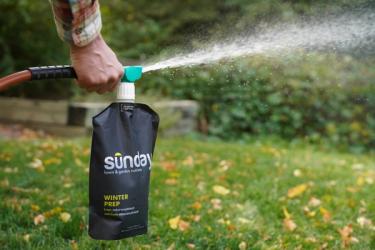
When should I leave my grass alone?
Foot traffic over frozen, dormant grass can really damage both blades and roots, so limit high traffic on your lawn when frost is present. Want to build a snowman? Try to build it over walkways or mulch to stay off the grass.
When should I deal with snow?
Keep an eye on the forecast so you can prep for snow events. Manage ice pockets on your grass through hand-removal or shoveling.
When should I frost seed?
Forgot to seed your cool-season lawn in the fall? Frost seeding is a fun winter bonus that involves spreading seed over your lawn and then letting nature do the work! When snow melts and temps rise in the spring, the seeds will start germinating.
Sunday Tip:
Your grass is resting and so should you. Savor hot cocoa under the stars, make snow angels, and take comfort that you’ve done everything you can for your lawn!
Ready for a deeper dive?
Hop on over to The Shed to learn more about caring for your lawn based on your grass type!
Stay on track with Sunday
When you sign up for a custom lawn plan, you’ll get a personalized checklist that lets you know when it’s time to treat your lawn. Mark it as you go!











